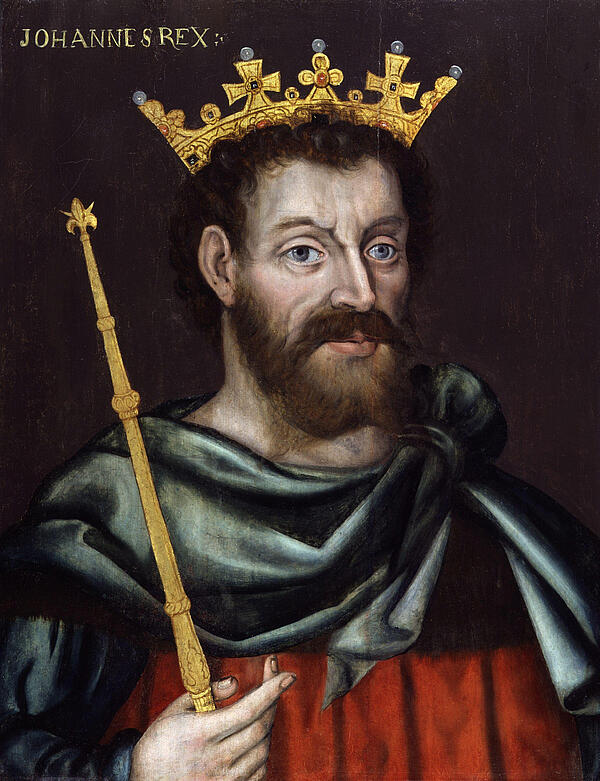King John
King John is an infamous monarch of Medieval England renowned for his role in the signing of the Magna Carta in 1215.
Born on Christmas Eve 1166, John was the youngest son of Henry II and Eleanor of Aquitaine and was famously overshadowed by his brother Richard. In fact, upon his death in 1189, Henry II left all his land to Richard I or Richard the Lionheart, leaving John with nothing but the nickname John Lackland.
In 1191, Richard left England on the Third Crusade leaving his brother in charge of the country. John already had a poor reputation as a leader, having been sent to rule Ireland by his father in 1185 where he lasted just six months, and his second attempt did not see much more success. After his brother was imprisoned in 1192 on his way back fro m the Crusades by Duke Leopold of Austria, John tried to steal the throne from him but failed in his attempt. Despite this, Richard made the decision to forgive him upon his return.

It wasn’t long before John had another chance to prove himself. In 1199, Richard was killed in France, making John the new King of England. Sadly though, John’s reign began poorly with the death of his nephew, Arthur of Brittany, in 1202. Many believed John to be behind the death and sought to oppose him, defeating his army in 1204 and forcing him to retreat. This damaged his reputation further, earning him the new nickname of John Softsword.
Known to have inherited his father’s bad temper, John decided to cover the costs of the defeat by raising taxes, but this angered all but his treasurers. He also lost favour with the church after clashing with the pope over the appointment of the Archbishop in 1207, which led to his excommunication and placed England under Church law.
As a result, no wedding or christening was considered legal until it was confirmed by the pope. The law also stated that only this christened would be able to enter Heaven, while all those born out of wedlock would be sent to Hell upon their death. This placed enormous pressure on the population of England, who blamed John for the potential fate of their souls.
John eventually relinquished to the church but all was not forgiven, and in 1214 the pope declared that anyone who attempted to overthrow the king had the legal right to do so. Meanwhile, John suffered another significant loss to the French at Bouvines, which resulted in England losing all of its French territories.
Facing pressure from the barons and the church, John was forced to sign the Magna Carta in 1215, which officially handed over many of his rights to the country. Displaying his temper once more, John attempted to retreat from the agreement in 1216, but he was met with force from the barons, who declared war against their king.
It was during this time that John became unwell, suffering from dysentery. He also witnessed the loss of his treasures as he attempted to cross water in the Wash, Lincolnshire, where the high tide covered his baggage train father than anticipated. Just a few days later John succumbed to his illness, dying on 19 October 1216 to be replaced by Henry III.
Thought history highlights John’s faults, there is still evidence that he was not the dark character that he is depicted as now. It’s possible that John fell foul of the common habit of the masses to disrespect kings once they were no longer alive to defend themselves.
See also: The Black Death of 1348 to 1350
MLA Citation/Reference
"King John". HistoryLearning.com. 2026. Web.
Key facts
| Name: | King John |
| Birth Date: | 24 December 1166 |
| Death: | 19 October 1216 |
| Buried: | Worcester Cathedral |
| Reign: | 6 April 1199 - 19 October 1216 |
| Predecessor: | Richard I |
| Successor: | Henry III |
